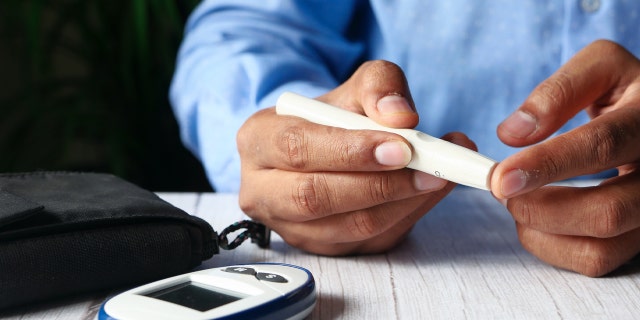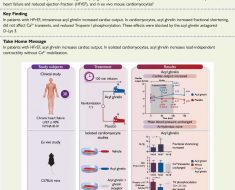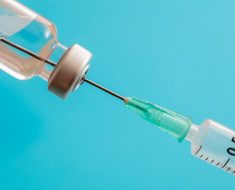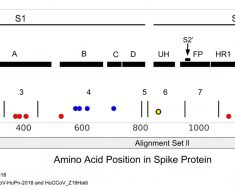
Fox News Flash top headlines for March 22
Fox News Flash top headlines are here. Check out what’s clicking on Foxnews.com.
A large new study found that people who recovered from Covid-19 within the past year are 40% more likely to receive a new diagnosis of diabetes compared to those who weren’t infected.
The increased risk translates into 1% of people who have had Covid-19 developing diabetes who otherwise wouldn’t have, the study’s author says, resulting in potentially millions of new cases world-wide.
Most of the people with diabetes in the study, published online Monday in the journal Lancet Diabetes and Endocrinology, were diagnosed with Type 2 diabetes, not Type 1. Some researchers say Covid-19 could also be triggering an entirely new type of diabetes in which certain cells mistakenly start to raise, rather than lower, blood sugar.
The study adds to evidence showing an increased post-Covid-19 risk of cardiometabolic conditions, such as diabetes as well as heart and kidney complications. Normally when people think of long-term Covid-19 symptoms, they think of problems such as cognitive issues, fatigue or shortness of breath. But scientists say there are likely different types of long Covid, and one appears to be defined by cardiometabolic problems that arise after Covid-19. So far, the World Health Organization estimates there have been more than 464 million cases of Covid-19, so even small percentages of those people developing long-term complications would be significant.
“We’re finding out more and more that it’s not only respiratory problems or brain fog or only fatigue,” says Ziyad Al-Aly , chief of research and development at the VA St. Louis Health Care System and a clinical epidemiologist at Washington University in St. Louis, who led the study. “There are heart manifestations, and clearly diabetes and kidney manifestations.”
Dr. Al-Aly’s group has recently published studies on those broader risks. One showed a higher risk of developing heart problems, including stroke and heart attack, in people who have had Covid-19 than in people who haven’t. Another showed post-Covid-19 patients were more likely to have declines in kidney function or kidney damage as much as six months after infection when compared to patients who hadn’t had Covid-19.
The researchers found only an association between Covid-19 and cardiometabolic conditions, without proving a cause. Some doctors say that new diagnoses of Type 2 diabetes and heart conditions could be influenced by weight gain or decreased activity during the pandemic, although lifestyle changes wouldn’t necessarily explain an increase specifically in people who have had Covid-19.
In the new diabetes study, Dr. Al-Aly and co-researchers analyzed the records of 181,000 Covid-19 patients in the Veterans Health Administration system who were diagnosed with Covid-19 within the past year and compared them to more than eight million people who didn’t have Covid-19. The VA study didn’t look at diabetes cases by vaccination status.
“When you look at the data on a national scale it’s clearly happening even in people who have no risk factors or very little risk factors,” Dr. Al-Aly said, adding that new diagnoses are happening even in young adults with a healthy weight and no previous history of high blood sugar.
Maren Laughlin, a program director at the National Institutes of Health National Institute of Diabetes and Digestive and Kidney Diseases, said the study was very well done. Its main limitation, she noted, is that VA patients generally tend to be older and sicker and include more males than the broader population.
It hasn’t been determined why a Covid-19 infection might be leading to new cases of diabetes. One possibility is that the virus might damage the pancreas’s ability to secrete insulin, the hormone that regulates blood sugar. Another theory is that the strong immune response to Covid-19 generates an inflammatory cascade that results in low-grade inflammation, which interferes with insulin secretion and sensitivity.

A man measures his blood sugar.
(iStock)
All types of diabetes share the symptom of high blood sugars, but they are distinct conditions. Type 2 is the most common, and can be associated with diet and exercise. Typically in Type 2, people become resistant to the hormone insulin, which regulates blood sugar. The pancreas struggles to keep up with the body’s increased demand for insulin, leading to higher blood-sugar levels.
Type 1, by contrast, is an autoimmune disease in which the body destroys pancreatic cells that produce insulin. Other types of diabetes include gestational diabetes, which can develop in pregnant women.
The latest study follows other recent research that has found an increased risk of a diabetes diagnosis after a Covid-19 infection, including a January Centers for Disease Control and Prevention report looking at children.
In a March study in the journal Diabetologia, German researchers found that people who had Covid-19 had a roughly 28% increased risk of a new Type 2 diagnosis compared to those who had an acute upper-respiratory infection that wasn’t Covid-19. The researchers compared data from more than 35,000 Covid-19 patients to an equal number of people with infections that weren’t Covid-19. They didn’t find an increased risk for other types of diabetes.
And a February JAMA Network Open study found that people who tested positive for Covid-19 had roughly a two times greater risk of a new Type 2 diagnosis one to five months after their infection compared to those who tested negative for the virus. About 7% of hospitalized adults with Covid-19 received new diabetes diagnoses within five months, compared to 3.6% of adults without Covid-19.
There are many challenges in interpreting the data, says Jason Block, an internal-medicine physician and associate professor at Harvard Medical School who is senior author of the JAMA study. Many people hadn’t been to see a doctor for a while during the pandemic, so they might have had diabetes without knowing it. In addition, steroids — a commonly used medication for severe Covid-19 patients — can temporarily increase blood sugar and might also trigger diabetes in patients at risk for the condition.

There are several possible biological reasons why a diabetes diagnosis might follow a Covid-19 infection. Research has indicated that the virus can infect and damage beta cells in the pancreas so that they produce less insulin.
In one study, researchers found that when they added the coronavirus to beta cell samples, genetic changes occurred in the cells that significantly reduced their ability to make insulin. Instead, to the researchers’ surprise, the cells did something unusual: They started making a different hormone, glucagon, whose function is to increase blood-glucose levels.
“The beta cells lost their cell identity and turned into a different type of cell,” says Shuibing Chen, director of the diabetes program at Weill Cornell Medicine in Manhattan, who led the study.
Dr. Chen says Covid-19 infection appears to be triggering a new type of diabetes that isn’t Type 1 or Type 2. Dr. Chen says her team is studying treatments specifically for Covid-19 patients newly diagnosed with diabetes to see whether they can block the process by which the cells might change.
Stanford researchers in an August study published in the journal Cell Metabolism documented another possible clue to post-Covid-19 diabetes. Lab studies found that the virus selectively targeted beta cells in the pancreas.
“It reduced their viability pretty quickly and reduced their ability to secrete insulin in less than a day,” says Peter Jackson, a professor in the microbiology and immunology department at Stanford University School of Medicine, and senior author on the study. “It’s a strong effect.”
Source: Read Full Article





